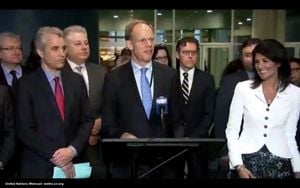Matt Gaetz, the controversial congressman from Florida, has found himself at the center of yet another political storm following his nomination by President-elect Donald Trump to serve as the Attorney General of the United States. This surprising move has sent shockwaves through the Justice Department, where anxiety and dismay are palpable among officials.
The nomination has triggered widespread debate, not just among Democrats but also within the Republican Party, as the fallout from Gaetz’s past actions looms large. Gaetz has faced allegations ranging from drug use to claims of sexual misconduct, all of which he denies. Nevertheless, there is significant concern about his ability to credibly oversee the department charged with upholding the law, especially when Gaetz himself has been investigated by it.
Republican Senator Markwayne Mullin of Oklahoma has voiced strong sentiments about the situation, insisting during an appearance on NBC’s "Meet the Press" last Sunday, "I believe the Senate should have access to [the House Ethics Committee's] findings." Mullin’s call for accountability raises questions about Gaetz’s potential fitness for the role, reminding many of the serious allegations still swirling around the former congressman.
According to sources, the House Ethics Committee was close to releasing its report investigating Gaetz’s alleged misconduct right before he resigned his congressional seat. This hasty departure effectively stifled the investigation's progress. Now, Mullin candidly acknowledged, "There’s no question Matt Gaetz and I have had our differences, and that's no secret," but he emphasized the need for the Senate to have the complete picture as it weighs Trump’s nominations.
Like much of Washington, the sentiment toward Gaetz is mixed. Some Republicans are unsure about the nomination and agree with their Democratic colleagues expressing outrage. The Florida congressman resigned from the House within days after Trump announced his intention to appoint him. His sudden resignation, critics argue, was a calculated move to evade scrutiny, especially as the Ethics Committee was preparing to take decisive action.
Public opinion has not been kind to Gaetz. The editorial board from Florida's Sun Sentinel expressed serious concerns about his suitability for the attorney general position, describing his nomination as emblematic of Trump's disregard for the law enforcement community. They stated, "Matt Gaetz must never become America’s attorney general," adding it would symbolize Trump’s desire to weaponize law enforcement against his political adversaries.
The potential confirmation of Gaetz as AG could unravel the credibility of the Justice Department and the Senate's role therein. The Sun Sentinel editorial argues, "Gaetz’s selection for the role lays bare the depth of Trump’s contempt for our national law enforcement apparatus," underscoring fears of politicization and bias under his leadership.
House Speaker Mike Johnson, himself caught between party loyalty and public accountability, weighed in by pushing to keep the report under wraps, arguing it would be inappropriate to disclose details about Gaetz’s past now, since he's no longer in Congress. Yet, this notion has been rejected outright by some lawmakers, who feel the public has the right to know what has transpired, especially with someone poised to take control of the Justice Department.
Compounding the controversy, Trump has suggested new strategies to bypass congressional oversight, including potentially utilizing “recess appointments” to fill Cabinet positions swiftly, which could lead to Gaetz's installation without proper vetting. Mullin speculated on this risk and stated, "It is very difficult to get there," acknowledging the limitations but also indicating willingness to explore every avenue for confirming appointments if needed.
Critics of Trump's plan, including many legal experts, note the stark conflict of interest involved if Gaetz were to oversee the department investigating his alleged actions. A former federal prosecutor stated bluntly, "Gaetz has zero chance of being confirmed as AG," pointing out the challenges he faces with public perception and legal scrutiny on his past actions.<\/p>
Even some GOP allies who previously supported Gaetz during his tumultuous time as congressman are now hesitant to endorse his nomination outright, with integrity and ethical governance weighing heavily on their minds. They recognize the significant risk not only to Gaetz's political future but also to their own credibility if they support such a controversial pick.
Should the Ethics Committee report be released, it could dramatically alter the narrative around Gaetz and jeopardize any chance he has at confirmation. The report, said to be scathing, is expected to detail findings related to Gaetz's behavior during his time in office, including manipulative tactics and possible bullying aimed at colleagues and witnesses.
Echoing this concern, there is growing skepticism among both the public and politicians about the dangers posed by Gaetz's nomination. The shadow of his alleged past actions hangs heavily over the proceedings as the Senate anticipates the Ethics report. If the document corroborates the various allegations against him, it could signal the end of any hopes Gaetz had of securing the position.
The weight of public opinion and the intense scrutiny surrounding his nomination serve as reminders of the precarious balancing act required of lawmakers as they await the Senate's judgment on Gaetz's qualifications. The notion of presenting anyone to lead the Justice Department with such allegations against his name not only tests political loyalties but also raises fundamental questions about accountability within government.
The entire situation paints Gaetz’s nomination as nothing less than politically charged, testing the boundaries of partisanship and prompting questions about the broader ramifications for the U.S. legal system. The Senate finds itself tasked with determining whether this controversial figure will become the face of American law enforcement or be turned away due to past indiscretions.
With the stakes this high, one thing is clear: the confirmation process for Matt Gaetz could turn out to be one of the most pivotal political showdowns the country faces as it grapples with issues of trust, ethics, and legality at the highest levels. Completion of the ethics probe and what it could reveal remains the final, determining factor as senators prepare to deliberate his future.<\/p>



